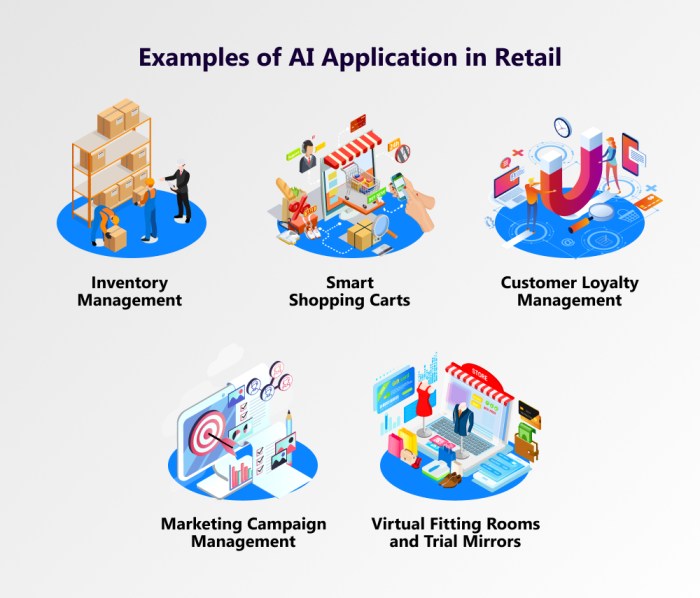AI in retail customer experience sets the stage for this enthralling narrative, offering readers a glimpse into a story that is rich in detail with American high school hip style and brimming with originality from the outset.
From personalized shopping experiences to AI-powered chatbots, the impact of artificial intelligence in the retail sector is undeniable. Let’s dive into the world of AI and its transformative effects on customer satisfaction and loyalty.
Importance of AI in Retail Customer Experience
AI plays a crucial role in enhancing the retail customer experience by providing personalized recommendations, streamlining the shopping process, and improving overall customer satisfaction.
Examples of AI Technologies in Retail
- Chatbots: AI-powered chatbots assist customers with inquiries, product recommendations, and issue resolution in real-time.
- Recommendation Engines: AI algorithms analyze customer data to offer tailored product suggestions based on preferences and browsing history.
- Smart Shelves: RFID technology and sensors help track inventory levels, optimize restocking, and enhance the in-store shopping experience.
Impact of AI on Customer Satisfaction and Loyalty
- Personalization: AI allows retailers to offer personalized recommendations and promotions, leading to increased customer satisfaction.
- Efficiency: AI streamlines processes, reduces wait times, and enhances overall shopping experiences, fostering customer loyalty.
- Data Analysis: AI analyzes customer data to identify trends, preferences, and pain points, enabling retailers to make data-driven decisions that improve customer satisfaction and retention.
Personalization in Retail with AI
In the retail industry, AI is revolutionizing the way businesses interact with customers by offering personalized shopping experiences tailored to individual preferences. By leveraging AI technology, retailers can analyze vast amounts of data to understand customer behavior and provide recommendations that cater to their unique needs.
How AI is used to personalize the shopping experience for customers
AI algorithms utilize machine learning techniques to track customer preferences, purchase history, browsing patterns, and demographic information. By processing this data in real-time, AI can generate personalized product recommendations, discounts, and promotions that are more likely to resonate with each customer. This level of personalization enhances the overall shopping experience and increases customer satisfaction.
Comparison of personalized recommendations generated by AI versus traditional methods
- AI-driven personalization is more accurate and effective than traditional methods because it can analyze a larger volume of data and identify subtle patterns that human analysis may overlook.
- Traditional methods often rely on manual data analysis and predetermined rules, limiting the ability to adapt to changing customer preferences in real-time.
- AI algorithms continuously learn and improve based on customer interactions, ensuring that recommendations remain relevant and up-to-date.
Benefits of AI-driven personalization for both customers and retailers
- Customers benefit from a more tailored shopping experience, saving time and effort in finding products that match their preferences.
- Retailers can increase sales and customer loyalty by offering personalized recommendations that lead to higher conversion rates and repeat purchases.
- AI-driven personalization can also help retailers optimize inventory management, pricing strategies, and marketing campaigns based on customer insights.
AI-Powered Chatbots for Customer Support

AI chatbots have revolutionized customer support in the retail industry by providing instant assistance to shoppers, enhancing the overall shopping experience, and increasing operational efficiency for businesses.
Transforming Customer Support
AI chatbots are transforming customer support in the retail industry by offering 24/7 assistance to customers, answering frequently asked questions, providing personalized recommendations, and resolving issues in real-time. These chatbots use natural language processing and machine learning algorithms to understand and respond to customer queries accurately.
- Enhanced Customer Service: AI chatbots can handle multiple customer queries simultaneously, reducing wait times and improving customer satisfaction.
- Cost-effective Solution: Implementing AI chatbots for customer support can significantly reduce operational costs for retailers by automating routine tasks.
- Personalization: AI chatbots can analyze customer data and preferences to offer personalized product recommendations, creating a more tailored shopping experience.
Successful AI Chatbot Implementations in Retail, AI in retail customer experience
One successful example of AI chatbot implementation in retail is Sephora’s Virtual Artist chatbot. This chatbot uses augmented reality and AI to help customers try on makeup virtually and receive personalized product recommendations based on their preferences.Another example is H&M’s chatbot, which assists customers in finding the perfect outfit by asking style-related questions and suggesting suitable clothing items available in their store.
Advantages of AI Chatbots for Customer Support
AI chatbots offer several advantages for handling customer queries and issues in retail, including:
- 24/7 Availability: AI chatbots are available round the clock, providing instant assistance to customers at any time of the day.
- Scalability: Chatbots can handle a high volume of customer queries simultaneously, ensuring efficient customer support during peak hours.
- Consistent Responses: AI chatbots provide consistent and accurate responses to customer queries, ensuring a seamless customer experience across all interactions.
Data Analytics and AI in Retail
AI plays a crucial role in revolutionizing retail customer experiences by leveraging data analytics to gain valuable insights into customer behavior and preferences. By analyzing vast amounts of data, AI enables retailers to make informed decisions and enhance customer satisfaction.
Utilizing AI for Analyzing Customer Data
AI algorithms are utilized to analyze customer data such as purchase history, browsing patterns, and demographic information. By processing this data, retailers can gain a deeper understanding of their customers’ preferences and tailor their offerings to meet individual needs.
Predicting Customer Behavior and Preferences
AI in retail helps predict customer behavior by identifying patterns and trends in data. By analyzing past interactions and purchase behavior, AI can anticipate future actions, enabling retailers to personalize marketing strategies and product recommendations.
AI-Driven Data Analytics for Informed Business Decisions
AI-powered data analytics provide retailers with actionable insights to make informed business decisions. By analyzing customer data in real-time, retailers can optimize inventory management, pricing strategies, and marketing campaigns to meet customer demands effectively. AI-driven data analytics empowers retailers to stay ahead of market trends and deliver personalized experiences that drive customer loyalty and satisfaction.